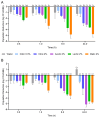Inactivation Kinetics of Listeria monocytogenes on Hard-Cooked Eggs Treated with Organic Acids
- PMID: 40941101
- PMCID: PMC12428107
- DOI: 10.3390/foods14172985
Inactivation Kinetics of Listeria monocytogenes on Hard-Cooked Eggs Treated with Organic Acids
Abstract
Peeled hard-cooked eggs (HCEs) are a popular and convenient choice for consumers and food servicers. A recent outbreak and several recalls of HCEs have highlighted their susceptibility to contamination with Listeria monocytogenes. HCEs are generally treated with antimicrobials, such as citric acid, to enhance the safety and quality of the product. A 2019 multistate outbreak linked to consumption of contaminated HCEs in the U.S. prompted research on the effectiveness of citric acid, and other organic acids, to control L. monocytogenes on this food product. This study therefore assessed the use of organic acids as antimicrobials against L. monocytogenes on HCEs. HCEs were dip-inoculated with L. monocytogenes, resulting in an initial concentration of ca. 8 log CFU/HCE. Following air-drying for 10 min, HCEs were treated at 5 or 25 °C with water, 0.3 or 2% citric acid, or 2% acetic, lactic, or malic acid for up to 24 h to determine reductions in L. monocytogenes populations. After 24 h of treatment, 0.3% citric acid treatment resulted in population reductions of <1.24 log CFU/HCE regardless of treatment temperature, while 2% organic acids resulted in statistically significant reductions of 2.88-4.78 log CFU/HCE at 5 °C and 2.35-5.10 log CFU/HCE at 25 °C. The highest L. monocytogenes reductions on HCEs resulted from the 2% malic acid treatment at 5 °C and the 2% acetic acid treatment at 25 °C. Primary modeling was used to determine the inactivation kinetics and model fit with the Weibull and log-linear models, both estimating the rapid rates of inactivation when using the 2% malic and lactic acid treatments at 25 °C. The results of this study suggest that 2% acetic, lactic, and malic acids may be effective treatments for the control of L. monocytogenes on HCEs.
Keywords: Listeria; cooked eggs; inactivation; organic acids; predictive modeling.
Conflict of interest statement
The authors declare no conflicts of interest.
Figures


References
-
- CDC Outbreak of Listeria Infections Linked to Hard-Boiled Eggs (Final Update) [(accessed on 8 May 2025)];2019 Available online: https://archive.cdc.gov/www_cdc_gov/listeria/outbreaks/eggs-12-19/index.....
-
- FDA Almark Foods Recalls Hard Cooked Egg Products in Pails Due to Possible Listeria monocytogenes Contamination. [(accessed on 8 May 2025)];2019 Available online: https://www.fda.gov/safety/recalls-market-withdrawals-safety-alerts/alma....
-
- FDA Recalls Associated with Almark’s Recall of Hard-Boiled Egg Products. [(accessed on 9 May 2025)];2020 Available online: https://www.fda.gov/safety/major-product-recalls/recalls-associated-alma....
-
- USDA FSIS Issues Public Health Alert for Products Associated with the FDA Almark Foods Recall due to Possible Listeria monocytogenes Contamination. [(accessed on 9 May 2025)];2020 Available online: https://www.fsis.usda.gov/recalls-alerts/fsis-issues-public-health-alert....
-
- FDA Control of Listeria monocytogenes In Ready-to-Eat Foods: Guidance for Industry (Draft Guidance) [(accessed on 17 March 2025)];2017 Available online: https://www.fda.gov/media/102633/download.
Grants and funding
LinkOut - more resources
Full Text Sources

